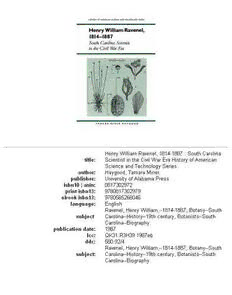
Henry William Ravenel, 1814-1887: South Carolina scientist in the Civil War era PDF
01987·0.581 MB·English
Most books are stored in the elastic cloud where traffic is expensive. For this reason, we have a limit on daily download.
Preview Henry William Ravenel, 1814-1887: South Carolina scientist in the Civil War era
Description:
"Provides an engaging and illuminating view of the culture of the South and the study of natural history. . . . Ravenel's achievements, Haygood argues, refute Clement Eaton's contention that slavery stifled creative thought; they also modify the more extravagant claim for southern equality with northern science made in Thomas Cary Johnson's Scientific Interests in the Old South (1936)." —American Historical Review"Convincingly argues for the importance of these middle years to understanding American science and vividly illustrates the effect of the Civil War on science. . . . Ravenel, a geographically isolated planter with a college degree but no scientific training, managed to serve as one of America's leading mycologists, despite continual financial and medical problems and the disruption of the Civil War. This lively account of his life and work is at once inspiring and tragic." Journal of the History of Biology"A thoroughly enjoyable biography of one of the important American naturalists, botanists, and mycologists of the 1800s. . . . Truly an outstanding contribution to the history of American science." —Brittonia
See more
The list of books you might like
Most books are stored in the elastic cloud where traffic is expensive. For this reason, we have a limit on daily download.
